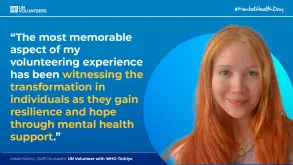Hazal Kalıncı is a UN Volunteer Staff Counsellor with the World Health Organization (WHO) in Türkiye. She has been supporting mental health and well-being of staff since the earthquake that struck 11 cities in the country on 6 February 2023. Her perspective is that good mental health and well-being is vital for those serving in humanitarian and emergency response. We interviewed Hazal on the occasion of World Mental Health Day, 10 October.
Volunteering in the mental health field has been a deeply enriching and transformative experience. It reminds me of the resilience of the human spirit and the power of compassion in making a difference in people's lives. --Hazal Kalıncı, UN Volunteer Staff Counsellor with WHO, Türkiye
When and why did you decide to volunteer?
I decided to volunteer because I have a passion for helping others and contributing to the well-being of individuals and communities. The mental health of the providers who work in the humanitarian field is highly important. During my experience in humanitarian work, I’ve observed that staff don’t consider their mental health to be their second or third priority, far from considering it their first priority. However, individuals cannot support others unless they are mentally healthy. Since the day I started to work, I have wanted to help the humanitarians and this was a perfect position for this.
Could you summarize being a volunteer in 3 words?
Rewarding, fulfilling, impactful.
Why did you choose to volunteer for this particular opportunity and organization?
I chose to volunteer for WHO because of its mission to address critical mental health issues globally. The organization's commitment to improving access to mental health services aligns with my professional goals and ideal working environment.
What are your tasks as a UN Volunteer?
My tasks include conducting mental health assessments, providing counselling and information about the MHPSS system in the area, facilitating support groups, building a network of MHPSS experts for the staff, facilitating support groups and raising awareness about mental health issues.
How would you describe your collaboration with the organization and, if applicable, other volunteers?
Collaboration involves regular communication with the organization's team and coordination with other volunteers through online platforms. We share resources, exchange ideas and support each other in achieving our goals.
How do you evaluate the impact your contribution has made locally?
I assess the impact of my contributions by tracking the number of individuals I've reached, improvements in their mental well-being, and the staff’s overall awareness and understanding of mental health.
How does being a volunteer affect you, your way of thinking, skills and future plans?
Volunteering has expanded my perspective, enhanced my clinical skills, and reinforced my commitment to mental health advocacy. It has also influenced my future career plans, making me more dedicated to this field. Since my assignment provides me great satisfaction, my motivation to do more to support staff is increasing day by day.
What is the most memorable thing about your volunteering experience?
The most memorable aspect of my volunteering experience has been witnessing the transformation in individuals as they gain resilience and hope through mental health support.
Could you tell us what kind of challenges you have faced during your volunteering experience and how did you overcome these challenges?
The biggest challenge I have faced is the stigma associated with mental health that exists all around the world. I overcome this by providing sensitivity, confidentiality, and offering psychosocial education to reduce misconceptions.
What do mental health and “Mental Health Day” mean to you?
Mental health, to me, means the psychological, emotional, and social well-being of individuals. "Mental Health Day" is an opportunity to raise awareness, reduce stigma and promote the importance of mental health care.
What is your educational and professional background?
I have a background in psychology, holding a master's degree in neuroscience. I wrote my thesis on the relationship between aggression levels and different music genres. I have also completed various internships and training programmes to gain practical experience in the field.

